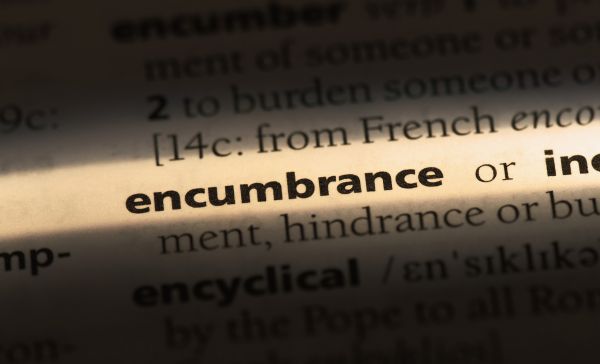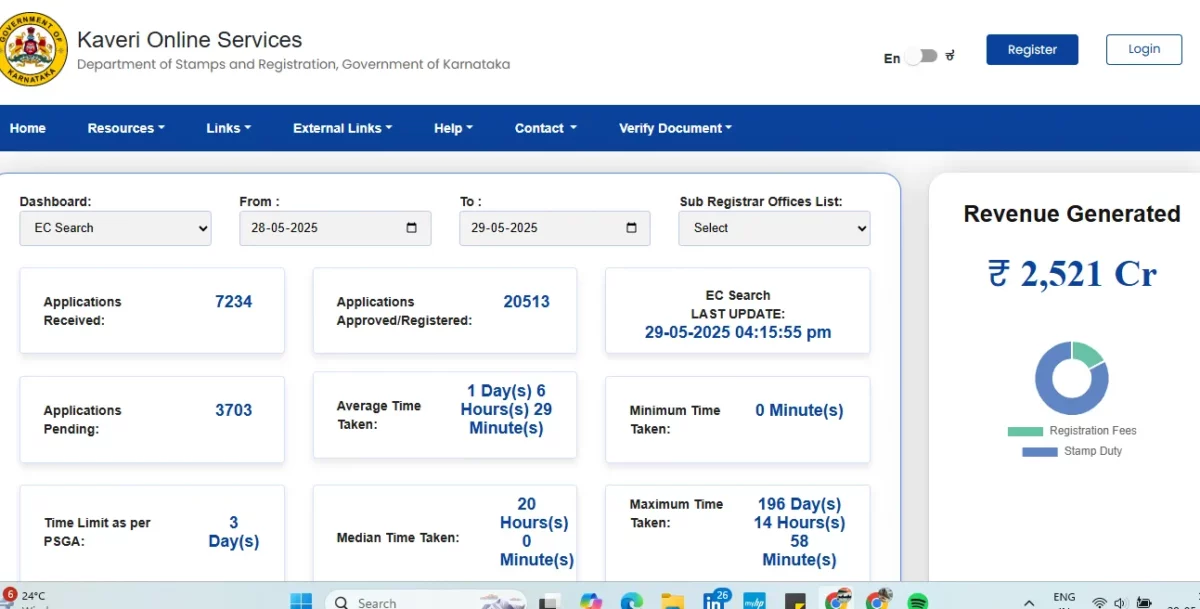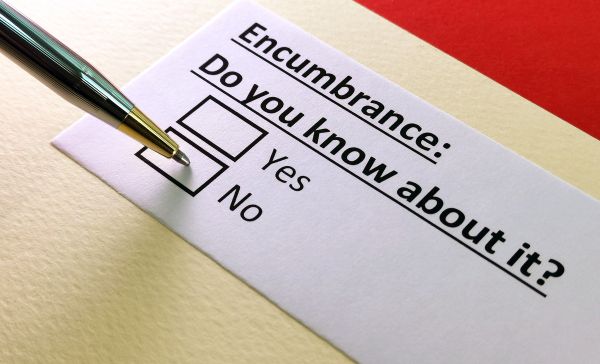Table of Contents
Quality Service Guarantee Or Painting Free

Get a rental agreement with doorstep delivery

Find the BEST deals and get unbelievable DISCOUNTS directly from builders!

5-Star rated painters, premium paints and services at the BEST PRICES!
Loved what you read? Share it with others!

Encumbrance Certificate AP: Online and Offline Application, Download and View Status Online in 2025
Table of Contents
Owning a home is a big achievement, but it comes with important steps like managing finances, finding the right property, and handling legal paperwork. One major risk is buying a property that has legal issues or is already promised to someone else. To avoid this in Andhra Pradesh, it’s important to get an Encumbrance Certificate (EC). This document confirms that the property is free from any legal problems or debts, protecting you from future headaches.
What is an Encumbrance Certificate?
An Encumbrance Certificate (EC) is an important legal document that proves a property is free from any financial or legal liabilities, such as loans or mortgages. It provides a record of all transactions related to the property, ensuring that it has a clear title. People typically request an EC when buying or selling property or applying for a loan. This certificate helps confirm that the property isn’t tied up in any disputes or claims.
For example, imagine you're buying a house. Before completing the purchase, you request an Encumbrance Certificate (EC) to ensure the property is free from legal issues or debts. The EC will show if the house has any outstanding loans, mortgages, or claims from others. If the EC shows no issues, it confirms that the property has a clear title, and you can safely proceed with the purchase, knowing it’s not involved in any financial or legal disputes.
Quality Service Guarantee Or Painting Free

Get a rental agreement with doorstep delivery

Find the BEST deals and get unbelievable DISCOUNTS directly from builders!

5-Star rated painters, premium paints and services at the BEST PRICES!
Encumbrance Certificate for Andhra Pradesh - Quick Info
The Andhra Pradesh encumbrance certificate serves as essentially the "financial and legal report card" for a property, exposing any factors influencing its worth or ownership. By providing this essential information, the EC enables possible buyers, sellers, lenders, and even property owners themselves to make wise choices about property-related issues.
| Feature | Details |
| Validity of EC | Typically 12 years, but can vary depending on the type of EC (Regular vs. Special) |
| Modes of Application | Online (IGRS AP Portal), Offline (Sub-Registrar Office), Meeseva Franchise |
| Mandatory Fields | Property details (address, survey number), Owner's details, Applicant's details, Period covered |
| Exemptions | It may vary depending on specific circumstances and government regulations. It's best to consult with the Sub-Registrar office for particular exemptions. |
| Application Status | Trackable online through the IGRS AP portal |
| Offline Availability | Available at the concerned Sub-Registrar office |
| Required Documents | Proof of ownership (sale deed, registration certificate, etc.), Applicant's ID proof, Property details, Payment receipt |
| Application Fees | Vary based on property value and Period covered. Check the IGRS AP portal or the Sub-Registrar office for the current fee structure. |
| Processing Time | It can vary depending on various factors. Generally, it may take a few days to a few weeks. |
| Legal Implications | Crucial for property transactions, loan applications, legal disputes, and overall property management. |
| Contact for Help | IGRS AP Helpdesk, Sub-Registrar office, Meeseva franchise centers |
| Important Points | Ensure accurate and complete information in the application form. Submit all required documents in the correct format. Track application status regularly. Verify the authenticity of the issued EC. Consult with legal professionals for any complex property-related issues. |
Why do you need encumbrance Certificate?
An EC for AP is very vital when making a property purchase. It lets prospective purchasers look closely at the legal and financial situation of the property. An EC is essential when selling a house to show prospective purchasers clear, unqualified ownership. It offers a recorded history of transactions, which would be rather helpful for proving correct ownership and settling legal disputes.
Encumbrance Certificates: Types
Essentially, there are two types of EC or Encumbrance Certificates, i.e., Form 15 and Form 16. This means that any EC on Form 15 will be issued from the sub-registrar’s office in case the property possesses any encumbrances when the applicant has sought the certificate. On the other hand, the nil-encumbrance certificate on Form 16 is issued by the sub-registrar’s office in case the property does not possess any registered encumbrances when the applicant has sought the certificate.
How to Apply Online for an Encumbrance Certificate?
If you want to apply for the encumbrance certificate online, you can visit the official EC website of the Andhra government and follow the steps below:
- Step 1: Select the option to apply for EC
- Step 2: Enter the details required for the application and click on update/save
- Step 3: Put in the period for which you want the EC and hit the ‘calculate fee’ button
- Step 4: Pay the required application fee and you will be taken to the ‘acknowledgement’ window, where you can take the print of the same by hitting on ‘view acknowledgement’
What is Eligibility Criteria of EC for Andhra Pradesh?
To apply for Andhra Pradesh EC online, you have to be either the registered Owner of the property or have the required permission from the registered Owner. Usually, this authority calls for a formal instrument, like a power of attorney.
- Property ownership: The applicant must be the property proprietor or an authorized representative.
- Property documents: A sale deed or partition deed, which is considered a valid property document, must be present.
- Verification of identity: Present government-issued identification documents, such as voter identification cards, Aadhar cards, and PAN cards.
- Fee payment: Ensure that the mandatory application fee is submitted.
- Registration information: The property must be registered at the Andhra Pradesh sub-registrar's office.
- No Objection Certificate (NOC): A No Objection Certificate (NOC) must be obtained if the property has multiple proprietors.
What are the Documents Required to Get an Encumbrance Certificate?
To get an encumbrance certificate, you need the following documents:
- Details of the property and the title deed
- Any past executed property sale deed, partition deed/ gift deed/ release deed
- The deed number along with the book number, date, and the applicant’s signature
- The document of property registration
- The document of the applicant’s address proof
How to get Offline Encumbrance Certificate in AP?
Although online applications are promoted, you may still get an EC offline by personally visiting the relevant Sub-Registrar office. The offline procedure generally consists of the following:
- Step 1- Get an application form straight from the Sub-Registrar office.
- Step 2- Submit the form to the Sub-Registrar's office, the necessary supporting documents, and the relevant fees.
- Step 3- Once issued, visit the Sub-Registrar's office to get the issued Encumbrance Certificate
How to Download Andhra Pradesh Encumbrance Certificate?
You can easily download the issued certificate straight from the IGRS site if you applied for the EC online using this portal:
- Step 1: Access the IGRS AP Portal. See the official IGRS AP page.
- Step 2: Verify your account login. Access your account using your registered credentials.
- Step 3: Track the situation of your EC application.
- Step 4: Download Certificate: From your account, you may download the EC digitally after the application is completed and issued.
How to View Encumbrance Certificate Online AP?
The applicant has the ability to seek encumbrances online by utilizing the online portal of the Andhra Pradesh Registration Department. All you need is an internet connection on your device. You can follow these steps and see current ECs online:
- Step 1: Visit the official IG RS AP Portal.
- Step 2: Find the required EC by using the search capability on the site. Usually, you may search using either the application number or property specifics (address, survey number).
- Step 3: View EC Details: Get and examine the particular EC's recorded transactions and other pertinent information.
What is the AP Stamp Duty and Registration Charge?
AP Registration Charges: The present stamp duty is assessed by the AP stamps and registration department at 5% of the property's cost, while the AP registration fee is assessed at 1% of the property's cost. 1.5% of the cost of the property is the transfer duty charged by the IGRS AP. This is assessed in accordance with the rules outlined in the AP Municipalities Act of 1965 and the AP Gram Panchayats Act of 1964.
According to AP Stamps and Registration, stamp duty is a tax that Indian governments impose on homebuyers in order to modify the property title and transfer ownership to the buyer. The additional fee customers must pay to the AP stamps and registration department in addition to the stamp duty is known as the "AP registration charge," which is a type of documentation fee.
| Instrument/ Document | AP Registration fee | Stamp duty | Charges |
| Sale deed | 1% | 5% | Rs 100 if value < Rs 50,000Res 200 if value > Rs 50,000 |
| Gift deed | 0.5% (minimum Rs 1,000 and maximum Rs 10,000) | 2 % on IGRS market value AP | Rs 100 if value < Rs 50,000Rs 200 if value > Rs 50,000 |
| Agreement of sale-cum-general power of attorney | Rs 2,000 | 5% | Rs 100 if value < Rs 50,000Rs 200 if value > Rs 50,000 |
| Sale with possession | 0.5% | 5% | Rs 100 if value < Rs 50,000Rs 200 if value > Rs 50,000 |
| Partition | Rs 1000 | 1% | Rs 100 if value < Rs 50,000Rs 200 if value > Rs 50,000 |
| Settlement deed | 0.5% | 2% | Rs 100 if value < Rs 50,000Rs 200 if value > Rs 50,000 |
| Mortgage with possession | 0.10% | 2% | Rs 100 |
| Mortgage without possession | 0.10% | 0.50% | Rs 100 |
What is the AP Stamp Duty and Registration Charge on Wills?
Keep in mind that there is no stamp duty due to the AP Registration and Stamps Department for the will deed. A will deed, however, is subject to AP registration fees. A will's AP registration in the testator's lifetime costs Rs 100 plus any applicable user fees. The registration fee of Rs 100 must be paid in order to have the will registered in AP following the testator's passing. Additionally, batta and processing fees at actuals will be collected along with the enquiry fees.
What are the Benefits of the Encumbrance Certificate in Andhra Pradesh?
An encumbrance certificate is an essential document that shows you records of transactions related to the property in question. Those records can usually go back as far as 12 or 15 years. As a homeowner, this is your surety that the property is debt-free or singly-owned. Some most common benefits of getting an Encumbrance Certificate in Andhra Pradesh are:
- If you want to sell the property further, EC is a binding document that is needed to seal the transaction.
- Banks and other financial lenders ask for EC when giving a home loan.
- If you want to use your Provident Fund (PF) account to pay for the property, you must have possession of EC.
- If the property or land tax goes unpaid for three or more consecutive years, then an Encumbrance Certificate must be submitted to the Village/Panchayat Officer.
- EC must be submitted for the mutation process of the property (Khata Registration / Khata Transfer / Patta).
What is the Process of Searching EC Online in Andhra Pradesh?
The government of Andhra Pradesh started processing the registration of properties in 1999. However, the entries stored in the computer database date back to 1983. Due to this reason, you can search for an Encumbrance Certificate in Andhra Pradesh post 01-01-1983 only. If you require transaction details dating before 1983, you must contact the concerned SRO office.
To apply for an online Encumbrance Certificate in AP, visit the state government's Registration and Stamp Department official website - IGRS Andhra Pradesh. The steps for getting an IGRS Encumbrance Certificate in AP are:
- Visit the official state portal of the Registration and Stamps Department of Andhra Pradesh for your copy of the online EC AP. Now, look for the services category on the top-right section of the webpage. To proceed, click on Encumbrance Search (EC). Next, you will be redirected to a new page.
- You will see the 'encumbrance Statement' on your screen. This document includes the IGRS AP Encumbrance Certificate details and a legal disclaimer. After reading the guidelines, click submit.
- You can search for the Encumbrance Certificate by using the document number, memo number or a none option.
- Search EC in Andhra Pradesh online using the document number:
- Select the document number option and year of registration from the given search criteria's drop-down menu. Next, enter the registered SRO, verify the captcha code and click on the submit button.
- You will then be able to see the details of that particular property.
- Search EC in Andhra Pradesh online using the memo number:
- From the given drop-down menu, select the memo number and the year of registration. Then, enter the registered SRO, verify the captcha code and click on the submit button.
- Search EC in Andhra Pradesh online using the none option:
- The site will redirect you to a new page if you select the none option. Here, you will have to fill out the form. Enter the below-mentioned details:
- District
- Applicant Name
- Building details
- Site or agricultural land details
- Boundary details
- SRO
- Enter the details, verify the captcha code and click on the submit button. You will be redirected to an EC statement where you will need to follow the mentioned guidelines.
What is the Application Fee for Getting IGRS EC in Andhra Pradesh?
| S.No | Service duration | Applicable Fee |
| 1 | Up to 30 years and less | Rs. 200 |
| 2 | More than 30 years | Rs. 500 |
How to Get EC Issued Online in Ap?
- Step 1 - Go to the IGRS AP website and look for the 'New Initiatives' column in the centre bottom part of the webpage. From the options displayed on the screen, select 'online EC'.
- Step 2 - You will be forwarded to a 'Citizen Registration' form. If you are using the web portal for the first time and don't have a login ID and password, register yourself by entering the details like Name, Password, Mobile No., Aadhar No., Email address, Residential address, User ID and Password. Verify the captcha code before proceeding.
- Step 3 - If you already have a login ID and password assigned, skip step-2 and proceed by entering your credentials on the 'Public Online Services' page. Enter the required details to get house EC online in Andhra Pradesh.
- Step 4 - Select Encumbrance Certificate and enter the document number, year of registration and SRO code. Then, click on the submit button.
- Step 5 - You will then be able to see all the details of the property. Verify and click next. Now, you will be able to choose between the options of a signed or unsigned Encumbrance Certificate.
- Step 6 - Select the 'unsigned certificate' option. You will then be redirected to a new page.
- Step 7 - On the left-hand side of the screen, you will see a 'select all' option. Click on that.
- Now, you can check all the property details and click on 'print' to download the Encumbrance Certificate for Andhra Pradesh online.
Note - If you want a signed Encumbrance Certificate, skip steps 6 and 7. Instead, select the signed certificate option instead of unsigned. You will then receive an OTP on your registered mobile number. Enter the OTP and have the encumbrance certificate downloaded.
How to Obtain a Certified Copy of the Andhra Pradesh Land Encumbrance Certificate Online?
- Step 1 - Visit the IGRS AP web portal.
- Step 2 - Enter all the relevant details like the district name, SRO Location, Registered document number, year of registration. Then, verify the captcha code and click on the submit button to get a certified copy for Encumbrance Certificate AP.
How to verify the Encumbrance Certificate from the Andhra Pradesh website?
- Step 1: Visit the online portal of the Andhra Pradesh government, the AP IGRS.
- Step 2: On the top-right corner, go to the 'Services' section and select the last option - 'Verify EC.'
- Step 3: Enter your department transaction ID. Click on the submit button.
How to Apply for an Encumbrance Certificate through Meeseva Franchise?
Here are the simple steps for applying an Encumbrance Certificate through Meeseva Franchise:
- Step 1 - Visit the nearest MeeSeva franchise centre.
- Step 2 - Submit a detailed application mentioning all the relevant details like document number, year of registration and SRO name. Also, note the mode of delivery of EC preferred.
- Step 3 - Pay the appropriate amount to the MeeSeva operator.
- Step 4 - Your request for EC will go through the AP Registration Department, and you will receive regular updates via SMS on the registered mobile number.
- Step 5 - As the concerned authority of the area, SRO will process your EC request. Finally, the Sub Registrar officer will approve your request for the EC after proper verification is completed.
- Step 6 - Once the EC request is approved; you will receive an SMS stating the same.
- Step 7 - If your mode of delivery is courier, the EC would be dispatched from the MeeSeva franchise to the mentioned address. On the other hand, if your mode of delivery was manual, you will have to pick it up yourself.
Andhra Pradesh EC: IGRS Importance
The IGRS AP EC is a crucial piece of ownership documentation.
Banks request the IGRS EC AP to obtain property credit. The paperwork reassures the financial institution that the property or land is not being sold.
If the property fee has not been paid to the AP stamps and registration department for more than three years, the panchayat/village officer must be handed IGRS EC AP to have the land charge records updated.
When taking back PF funds and developing real estate, IGRS EC is required.
What are some of the Most Common Details mentioned in EC?
- Name of the applicant who has applied for the Encumbrance Certificate (online or offline).
- The application form holds all the crucial property details.
- Duration for which Encumbrance Certificate has been issued.
- Complete property details as per the Sale Deeds recorded in the Sub Registrar's Office.
- Transaction details for the said property.
Common Mistakes to Avoid While Applying for an EC in AP
Reading the EC helps consumers see any past debts that can compromise their ownership rights or lead to future legal disputes. To ensure a smooth and successful EC application, it's crucial to avoid these common mistakes:
- Inaccurate Property Details:
- Providing incorrect or incomplete property details can lead to delays and errors in the application process.
- Double-check all property details, including address, survey number, and plot number, for accuracy.
- Missing or Incorrect Documents:
- Submitting incomplete or incorrect documents can delay the application and may even lead to rejection.
- Ensure you submit all required documents in the correct format and with accurate information.
- Incorrect Payment:
- Paying the incorrect application fee can cause delays and may require you to resubmit the application with the correct payment.
- Verify the correct fee amount and ensure accurate payment.
- Incomplete Application Form:
- Leaving any sections of the application form incomplete can result in rejection or delays.
- Fill in all sections of the form accurately and completely.
- Ignoring Application Status:
- Regularly track the status of your application to ensure timely processing.
- If you encounter any issues or delays, contact the concerned authorities promptly.
Why should Andhra Pradesh Citizens know about the Encumbrance Certificate?
While the encumbrance meaning is ‘burden’ or ‘liability’ on your finances, it is better to do this step. You must check that the property has a clear title before purchasing it. Obtaining an Encumbrance Certification guarantees that the asset you seek to purchase is free of legal or financial obligations. Correcting any charges on the EC before proceeding with the purchase is critical. It will also assist you in determining whether any current owners have a legal claim to the land. Besides that, if you want a loan for buying a house, a land EC is one of the key documents you must submit to your lender or bank.
Especially in India, where provisions as per law can be a bit complicated to navigate and understand, this vital step of EC registration should be done. In Andhra Pradesh, the laws of the state can also differ from others, and it is, therefore, very important to safeguard your and your property’s interests. In the present day, the process has also become simpler as online EC applications can be done from the comfort of your home.
Is an Encumbrance Certificate Enough to Declare a Property Hassle-Free?
Encumbrance Certificate AP is an official document that shows all the property and transaction details lodged in the Sub Registrar's Office. However, it does not show any information that the property owner has not registered with the concerned authorities in the respective area. Therefore, it is advised that all buyers complete a thorough legal check and due diligence before purchasing the property.
As a homeowner, you need to cross many financial and legal hurdles. Apart from arranging the budget for the down payment, setting up monthly EMI and finding the property that suits you best, you must also ensure that you are not investing in the wrong place. If you end up purchasing a property for which a previous loan has not been cleared or is promised to any third party, you might end up as a victim of land fraud.
Therefore, having all the essential official documents is necessary to prevent any court cases and waste all the effort and money. One such important document is the Encumbrance Certificate. The word 'encumbrance' itself means an impediment or burden. This means that the Encumbrance Certificate helps prove that the property is free from any financial or legal ties. In addition, an EC might help you see all the past transaction details for the said property. If you are also looking for a property in Andhra Pradesh and need guidance with official documents like Encumbrance Certificate AP, contact NoBroker professionals for step-by-step aid, all for a minimal cost.
Frequently Asked Questions
Ans: The Registration and Stamp Department is responsible for issuing the Encumbrance Certificate.
Ans: The Encumbrance Certificate has two categories - form 15 and forms 16. Form 15 includes all the pertinent property information, registration documents, information related to taxes/loans/transactions and whether the property is mortgaged, leased etc. Form 16 is a non-encumbrance certificate issued when the property is free from any encumbrance at all.
Ans: You can check all Encumbrance Certificate related details on the web portal of the state government.
Ans: EC is needed to ensure that the property you are investing in is free of any legal ties and financial debts. Banks usually ask for an EC before approving a home loan.
Ans: EC can be issued offline by the district's Sub-Registrar Office or by approaching the MeeSeva Franchise.
Ans: Concerned Sub-Registrar offices in Andhra Pradesh provide Encumbrance Certificates.
Ans: Factors such as the number of applications, the degree of property intricacy, and the efficiency of the Sub-Registrar office might affect an EC's processing time. Usually, an EC is obtained in a few days or many weeks.
Ans: Indeed, you may easily apply for an EC online via the IGRS AP site.
Ans: For a comprehensive list of the necessary paperwork, see the part above," Documents Needed to Get an Encumbrance Certificate."
Ans: You may log in to your IGRS AP account and download the certificate straight from the portal upon processing your application and issuing the EC.
Recommended Reading

Doctrine of Adverse Possession: What It Means and How to Claim Property Rights in 2025
May 28, 2025
89157+ views

EC Online Bangalore: Importance, Online Application and Status Check in 2026
June 1, 2025
67173+ views

How to Apply Encumbrance Certificate in Tamilnadu Online and Offline 2025
May 1, 2025
43685+ views

Encumbrance Certificate Karnataka - Online and Offline Application Process in 2025
January 2, 2025
43409+ views

Everything You Need to Know About NOCs for Property Transfer in India
January 31, 2025
36084+ views
Loved what you read? Share it with others!
Most Viewed Articles

Franking Charges Explained: Meaning and Benefits
January 31, 2025
1115276+ views

Society Maintenance Charges : Meaning, Cost, Types and Calculation
January 31, 2025
192897+ views

BBMP E-Khata Registration process for property owners in Bangalore, Karnataka in 2025
March 19, 2025
145603+ views

Daughter's Right in Fathers' Property - the Law is Finally Equal for both Genders?
June 1, 2025
131997+ views

Rectification Deed Format and Process in India 2025
June 1, 2025
127512+ views
Recent blogs in
How To Register a Rent Agreement Online In Gujarat: Process, Documents and Fees in 2026
January 19, 2026 by Ananth
What is Registered Lease Agreement: Meaning, Legal Validity, Benefits and Online Registration
January 19, 2026 by Krishnanunni H M
What Is a Room Rental Agreement: Meaning, Purpose and Importance in 2026
January 12, 2026 by Kruthi









 Full RM + FRM support
Full RM + FRM support
Join the conversation!